INDEX
- English
- 日本語
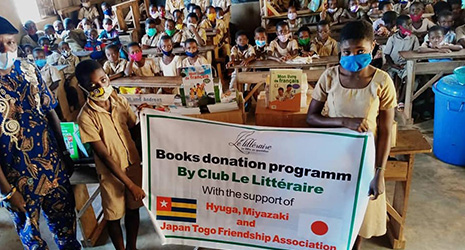
Children at an elementary school in Togo that received books from Hyuga - English
- 日本語
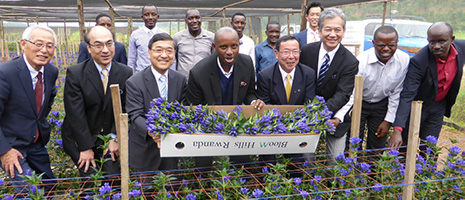
Hachimantai representatives visiting a Japanese gentian farm in Rwanda, May 2018
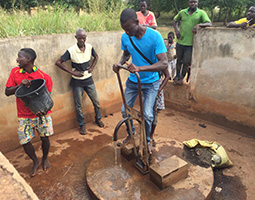
The well repaired through Hyuga–Togo cooperation 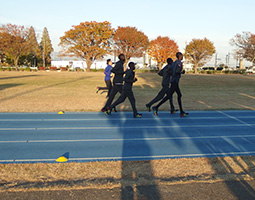
South Sudanese athletes training in Maebashi 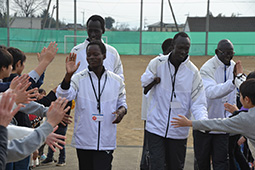
South Sudanese athletes interacting with elementary school students, February 2020 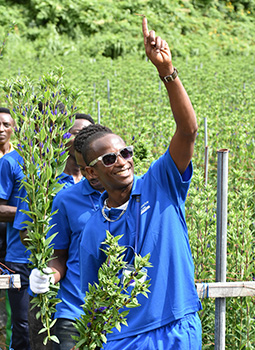
Rwandan athletes picking Japanese gentian during the training camp in Hachimantai in July and August 2019
June 2021
International Cooperation through Host Towns
The Host Town Initiative facilitates exchanges between Japanese people and people from the countries and regions participating in the Tokyo 2020 Olympic and Paralympic Games. Here we introduce three Host Towns that are engaged in initiatives such as improving the living environment in their counterpart country and supporting the athletes’ training and daily lives.
Hyuga City and the Republic of Togo


Hyuga City, Miyazaki Prefecture on the Pacific coast of Kyushu is the Host Town for the Republic of Togo (hereinafter Togo) in West Africa. Exchange activities began in 2017 when the Chargé d’Affaires ad interim of Togo visited Togo Town (pronounced similarly to Togo the country) in Hyuga by invitation of the Japan-Togo Friendship Association. Hyuga was registered as a Host Town in December 2018.
In March 2019, a delegation from Togo including a marathon runner and percussionist visited Hyuga. The group deepened friendly relations with local residents through singing and dancing with elementary school students and participation in a marathon event.
Having become the Host Town for Togo, in September 2020 Hyuga City concluded a three-way agreement of mutual cooperation with the Togo Embassy in Japan and the Japan–Togo Friendship Association, in order to engage in a wider range of initiatives. The first assistance project based on this agreement, which ran from November 2020 to March 2021, involved repairing wells and installing public restrooms in Attité Kopé, a village with a population of about 400 people, located some 65 km from the Togolese capital Lomé. This made it less burdensome for residents to collect water and also improved public hygiene. Moreover, a total of about 600 books were donated to elementary schools, a junior high school and a library in cooperation with Miyazaki Academy Rotary Club.
Hyuga City plans to continue and develop its support and mutual exchange with Togo after the Tokyo 2020 Olympic and Paralympic Games.
Maebashi City and the Republic of South Sudan


Maebashi City, Gunma Prefecture, which is the Host Town for the Republic of South Sudan in East Africa (hereinafter South Sudan) has hosted a long-term pre-Games training camp of the South Sudanese team for the Tokyo 2020 Olympic and Paralympic Games since November 2019, before the spread of COVID-19.
The team consists of one coach, three athletes in the sport of athletics for the Olympics, and one athlete in the sport of athletics for the Paralympics. South Sudan became independent in 2011 after a long conflict, but social instability persists even today, and the athletes’ training environment is tough. Maebashi City recognized that hosting the South Sudanese athletes could boost their performance, contribute to the country’s peace, and prompt Maebashi citizens to reflect on peace through interaction with the athletes.
Maebashi City provides an environment for the athletes’ intensive training and supports all aspects of their daily lives, including food and healthcare. More and more people are becoming involved in this support, such as by residents making donations and companies providing sports equipment and other items. This support allows the athletes to focus on their training and they are starting to get good results. At the para athletics championship in Japan in April 2021, for example, the South Sudanese athlete finished first in the 100- and 200-meter races. Between training sessions, the athletes are enthusiastically working to learn Japanese and computer skills for use in their future lives.
Maebashi City plans to continue sports exchanges with South Sudan even after the Tokyo Games, including the hosting of athletes.
Hachimantai City and the Republic of Rwanda


Hachimantai City in Iwate Prefecture is one of the main production areas in Japan of rindou (Japanese gentian), a plant that blooms with blue purple flowers. As a Host Town, Hachimantai is deepening exchanges with the Republic of Rwanda (hereinafter Rwanda) in East Africa, activities that were sparked by the Japanese gentian.
Hachimantai City has been working to not only export its Japanese gentian, but also secure production areas overseas in order to expand demand and ensure stable supply. As part of that, the City commenced trial cultivation in Rwanda in 2015. Rwanda has a stable climate throughout the year and was thought to hold great potential as a hub for producing gentian for the European markets. Hachimantai worked together with Iwate University and Japanese companies to provide seedlings, dispatch producers to Rwanda to give technical instruction, invite Rwandan producers to Hachimantai for training, and support in other ways. As a result, Japanese gentian cut flowers from Rwanda were shipped to the Netherlands for the first time in May 2018 where they were received favorably and, in 2019, 140,000 flowers were exported to Europe. It is expected that the gentian cultivation will greatly contribute to Rwanda’s development.
Amid this, the city’s exchange activities as Host Town also became more energetic. In July and August 2019, before the spread of COVID-19, a team of Rwandan athletes in the sports of athletics, road cycling and beach volleyball came to Hachimantai for a training camp. The team interacted with local residents through activities such as trying out gentian picking and visiting schools.
The Japanese gentian has become a beautiful symbol of the friendship between Hachimantai and Rwanda.

